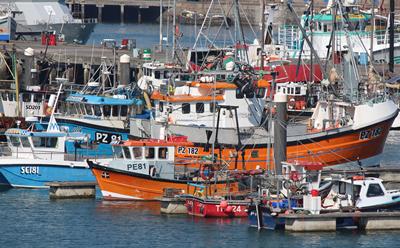
The United Kingdom has a unique opportunity to start rebuilding its fish stocks by taking advantage of the slowdown in commercial fishing caused by the COVID-19 pandemic and ongoing Brexit negotiations, new research has shown.
by the University of Southampton, the GEOMAR Helmholtz Centre for Ocean Research and the Sea Around Us initiative at the University of British Columbia sets out how the UK Government can take a new approach to managing its fishing waters.
After Brexit the UK will no longer be bound by the Common Fisheries Policy and therefore has the chance to develop a new policy focused on sustainability and preserving the livelihoods of fishing communities. Furthermore, the reduction in fishing activity caused by the COVID-19 pandemic has seen pressure on some threatened species fall to levels not seen since World War II, giving opportunities to help fish populations recover and increase the potential economic returns for fishers.
“Several stocks targeted by UK fishers are in a degraded and precarious state, with around 40 per cent that will continue to be overfished when normal activity resumes,” said , lead author of the study and a researcher at the University of Southampton. “One of the reasons for this is that fishing quotas – or how much of each species can be caught in a certain area by each country – are set by the EU at levels higher than those that would enable the recovery of the populations.”
To regulate the ongoing harvest beyond sustainable limits, the researchers propose fishing targets be set to levels in which fishers leave more fish in the water than the minimum required to generate maximum sustainable yields.
“Maximum Sustainable Yield or MSY is defined as the highest catch that can be continuously taken from a stock under existing environmental conditions,” said Rainer Froese, co-author of the study and senior scientist at GEOMAR. “Smart fisheries management, such as applied in Australia, aims for a little less than MSY. That reduces the risk of unintentional overfishing and ensures close to maximum catches, year after year.”
“This will allow fish populations to recover to levels that are higher than those that can produce MSY to ensure large and diverse populations that will be better prepared for climate change, stabilize ecosystems, and at the same time maximize fishers’ profits,” said Daniel Pauly, co-author of the study and principal investigator of the Sea Around Us initiative at the University of British Columbia. “The opportunity to do this is now because of the slowdown caused by COVID-19 and because after Brexit, the UK will be in a position to insist in its negotiations with the EU that fishing quotas advised by scientists not be exceeded.”
As an additional safeguard for sustainable and highly profitable fishing in the post-Brexit and post-COVID-19 world, the researchers propose further creation of a “blue belt” of Marine Protected Areas around the UK coast, and enforcement of their protected status, something that up until now has been seriously lacking.
“The establishment of MPAs is one of the most cost-effective ways to restore overexploited stocks and habitats on which fish depend, to the mutual benefit of the fishing industry who experience increased catches in grounds immediately outside of MPAs,” Pauly said.
The researchers warn that strong conviction will be required to ensure these areas are suitably protected as there are likely to be disputes with EU members who may regard this as a challenge to their perceived historic fishing rights.
“Brexit divided the UK and the whole world has been challenged by the global health pandemic” added Professor Kemp. “However, regardless of how people voted, UK politicians have the chance to bring people together over a common goal that supports fishing communities, wider society and environmental sustainability. The opportunity is there but it will require political vision; with the necessary strength of character the negotiators can deliver a positive outcome from the combined systemic shocks of Brexit and COVID19.”






